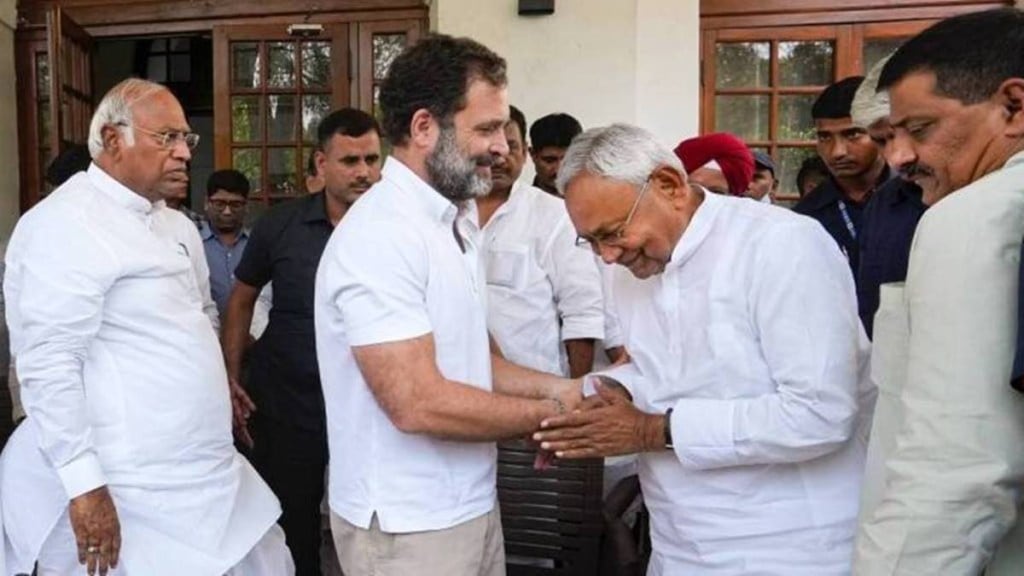The Centre’s decision to confer the Bharat Ratna, India’s highest civilian honour, posthumously on former Bihar Chief Minister late Karpoori Thakur has been welcomed by parties cutting across the political spectrum. A socialist popularly referred to as ‘Jan Nayak’, Karpoori served as the Chief Minister of Bihar from December 1970 to June 1971 and from December 1977 to April 1979. He passed away on February 17, 1988.
The development comes at a time when the Bihar government led by Chief Minister Nitish Kumar is holding a three-day celebration to mark Karpoori Thakur’s 100th birth anniversary from January 22-24. Revered as a champion of social justice, it was Thakur who first introduced the concept of layered reservation. As Chief Minister in 1978, Karpoori introduced a 26 per cent reservation model which proposed 12 per cent quota for Extremely Backward Classes (EBCs), 8 per cent for Other Backward Classes (OBCs), 3 per cent for women and 3 per cent for economically backward classes from among the upper castes.
Also Read: Narendra Modi’s tribute to Jan Nayak Karpoori Thakur on 100th birth anniversary
Hailing from the ‘nai’ (EBC) community, Karpoori Thakur has been revered by political parties as a champion of social justice – someone who saw the opportunity and carved out the EBCs from backward classes. It is this non-Yadav brand of politics that is also seen as the factor behind Nitish Kumar’s success. It is this differentiation that made Nitish drift away from Lalu Prasad Yadav, a prominent Yadav leader in Bihar, and associate with the Bharatiya Janata Party in the 1990s.
The Opposition, particularly the Congress, has been pushing for a single OBC quota similar to what was recommended by the Mandal Commission. Nitish kumar, on the other hand, has thrived on the EBC base ever since his appointment as the CM in 2005. The BJP, by honouring Karpoori, has brought back focus on this clear line of distinction between the politics of the RJD and the JD(U) in Bihar. In the process, it has also fanned the differences between the two ruling allies that have lately not seen eye to eye in the evolving power dynamics in Bihar.
Also Read: Who was ‘Bharat Ratna’ Karpoori Thakur? A trendsetter in politics, champion of the marginalised
And the fissures within the INDIA bloc became visible on Wednesday when Nitish led a veiled attack against the RJD and the Congress a day after the President announced conferring the honour on the late Bihar CM. “Jan Nayak Karpoori Thakur never promoted his family. Today, many people only keep promoting their family members,” Nitish said on Wednesday without naming the Congress or the RJD.
“We had been demanding ‘Bharat Ratna’ for Karpoori Thakur from 2007 to 2023 from every government, including the previous Congress government and the incumbent government in power. But they did not do so. Now, they have given him a ‘Bharat Ratna’. I congratulate the PM and the central government for accepting our demand,” Nitish added.
Also Read: Course correction or last roll of the dice? The many battles of Nitish Kumar
Nitish’s bid to claim credit for the honour to the socialist icon stems from the BJP’s own attempts to eat into the JD(U)’s carefully cultivated Luv-Kush or the Kurmi-Koeri vote bank within the EBC-OBC bloc that the ruling alliance partners in Bihar call their core support. Be it the appointment of Kushwaha leader Samrat Choudhary as its state unit chief or the prominent EBC leader Hari Manjhi its state council leader, the BJP has been making continuous attempts to chip into Nitish Kumar’s loyal vote base.
As per the findings of a caste survey conducted by the Nitish government last year, EBCs form the biggest caste group in the state comprising 36.1 percent of the population. The EBCs are followed by OBCs — including Yadavs that form RJD’s core vote bank — at 27.12 percent, the Scheduled Castes, including Dalits, at 19.65 percent, and Muslims at 17.7 percent. The findings of the caste survey and subsequent revision in quota has made Bihar a tricky battleground for the BJP following Nitish rejoining the RJD.
Also Read: With Bihar quota hike, Nitish Kumar steals the march on friends and foes alike
The Bharat Ratna to Karpoori Thakur also blends with the BJP’s positioning of Prime Minister Narendra Modi as the champion of the EBCs. Addressing the media, BJP leader Sushil Modi said that it was PM Modi, an OBC leader, who is “fulfilling Karpoori’s legacy”. As cabinet ministers, neither Lalu Prasad Yadav nor Nitish Kumar could confer the Bharat Ratna on Karpoori, he said. “No prime minister has ever done so much work to empower the EBCs.”
By positioning itself as the champion of the backward classes, the development also comes across as a bid to blunt the Opposition’s national pitch for a caste census by announcing a Bharat Ratna for the socialist leader. By playing the social justice card, the BJP, which has already established a firm hold over the Hindi heartland with the Ram Mandir push, looks set to shrink the Opposition’s playing field further just ahead of the Lok Sabha elections.
The BJP, which won 17 of the 40 parliamentary seats in the 2019 Lok Sabha polls, has set a target to win 35 of these seats in the upcoming general election. The NDA, which included the JD(U), bagged 39 of the 40 seats in the state in the last elections.
Also Read: Masterstroke or Catch-22? The good, bad and ugly of Nitish Kumar’s caste gambit

